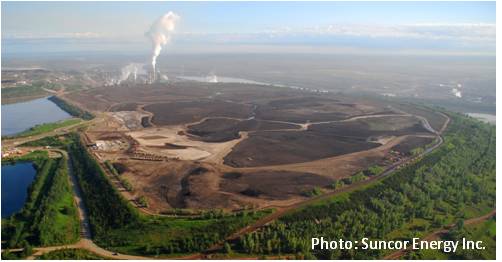A paper by researchers at the University of Alberta, Edmonton found that the impact of Canadian oil sands mining, and subsequent land restoration, on carbon release has been significantly underestimated. This is due to the mining process’s destruction of peatland – bogs, swamps, etc. that host partially decayed organic matter – which, when destroyed, releases high levels of carbon.
From the paper’s abstract in the Proceedings of the National Academies of Science:
“We quantified the wholesale transformation of the boreal landscape by open-pit oil sands mining in Alberta, Canada to evaluate its effect on carbon storage and sequestration. Contrary to claims made in the media, peatland destroyed by open-pit mining will not be restored. Current plans dictate its replacement with upland forest and tailings storage lakes, amounting to the destruction of over 29,500 ha of peatland habitat. Landscape changes caused by currently approved mines will release between 11.4 and 47.3 million  metric tons of stored carbon and will reduce carbon sequestration potential by 5,734–7,241 metric tons C/y. These losses have not previously been quantified, and should be included with the already high estimates of carbon emissions from oil sands mining and bitumen upgrading. A fair evaluation of the costs and benefits of oil sands mining requires a rigorous assessment of impacts on natural capital and ecosystem services.”
metric tons of stored carbon and will reduce carbon sequestration potential by 5,734–7,241 metric tons C/y. These losses have not previously been quantified, and should be included with the already high estimates of carbon emissions from oil sands mining and bitumen upgrading. A fair evaluation of the costs and benefits of oil sands mining requires a rigorous assessment of impacts on natural capital and ecosystem services.”
Should this information impact U.S. debate about the Keystone XL Pipeline? Why or why not? What do you think of the role of environmentalism in the debate so far?